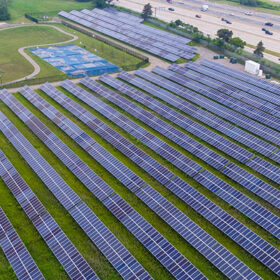Florida Governor Desantis has signed new legislation that removes the state’s goals of developing plans to reach 100% renewable electricity by 2050. Their law also bans all offshore wind within one mile of the coast. Last week, they even banned using the term “climate change” in government documents.
The state is currently under stress by insurance agencies pulling out of covering homeowners due to an increase in intensity and damage from hurricanes driven by climate change.
On Twitter, DeSantis wrote:
We’re restoring sanity in our approach to energy and rejecting the agenda of the radical green zealots.
Newly signed legislation, CS/CS/HB 1645, has repealed renewable energy targets set by the Agricultural Commissioner in 2022. These statewide renewable energy goals required utilities to generate 40% of their electricity from renewable sources by 2030, increasing to 63% by 2035 and 82% by 2040, with a goal to reach 100% renewable energy ten years later.
Data from pv magazine USA’s 50 States of Solar indicates that over the twelve months leading up to and including February, Florida generated 6.88% of its electricity from solar power. In February alone, utility-scale solar power contributed 7.46% to the state’s electricity, marking a significant increase due to numerous solar projects that came online in January.

Small-scale solar contributed 1.88% to Florida’s total electricity in February, bringing the cumulative contribution from solar to 9.33% for that month. While the legislation bans wind, Florida does not utilize wind power, either onshore or offshore. The state’s wind resources are not considered financially viable, according to charts made available by the National Renewable Energy Laboratory.
Additionally, CS/CS/HB 1645 allows power companies to construct methane pipelines up to 100 miles long without needing a certification, an increase from the previous 15-mile limit.
In response to hurricane threats, previous legislation aimed to develop solar energy technologies to supply electricity to critical areas when the main infrastructure fails. However, the new law has stricken the word “solar” from the legislation.
The new law also mandates state research into advanced nuclear technologies.
Interestingly, in 2022 the Florida Governor surprised many across the nation when he vetoed a bill that would have initiated the reduction of net metering for residential and commercial behind the meter solar power.

According to the Solar Energy Industries Association, Florida will deploy 15,592 MW of solar over the next 5 years, which would rank it third in the United States.
This content is protected by copyright and may not be reused. If you want to cooperate with us and would like to reuse some of our content, please contact: editors@pv-magazine.com.








By submitting this form you agree to pv magazine using your data for the purposes of publishing your comment.
Your personal data will only be disclosed or otherwise transmitted to third parties for the purposes of spam filtering or if this is necessary for technical maintenance of the website. Any other transfer to third parties will not take place unless this is justified on the basis of applicable data protection regulations or if pv magazine is legally obliged to do so.
You may revoke this consent at any time with effect for the future, in which case your personal data will be deleted immediately. Otherwise, your data will be deleted if pv magazine has processed your request or the purpose of data storage is fulfilled.
Further information on data privacy can be found in our Data Protection Policy.